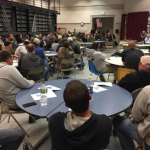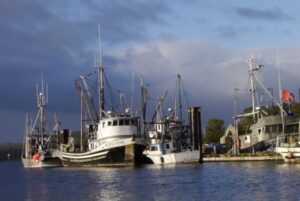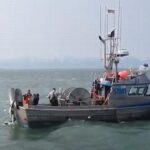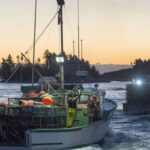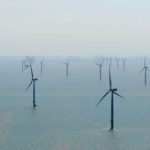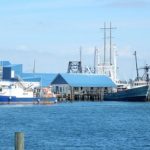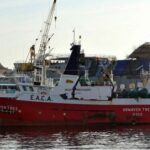Tag Archives: lobster industry
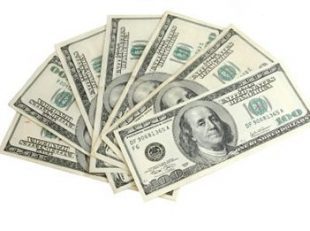
Golden and Graves introduce bi-partisan legislation to make disaster relief funds available to fishermen
In a bipartisan effort, Rep. Jared Golden (D-Maine) and Rep. Garret Graves (R-Louisiana) on Thursday introduced legislation to make additional disaster relief available to thousands of fishermen whose businesses are harmed by a pandemic. The legislation would amend the Magnuson-Stevens Fishery Conservation Act to allow fisheries disasters to be declared due to pandemic, such as Coronavirus. My bipartisan bill with Congressman Graves would make pandemics an allowable reason to declare a fisheries disaster, opening up a process to direct federal relief funds to affected fishing communities. >click to read< 11:55
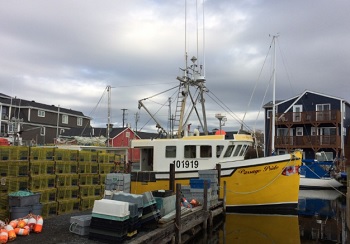
After months of lobster industry losses, things may finally be taking a turn for the better
“We’ve come through the pandemic and it’s been challenging for everyone, to say the least,” says Geoff Irvine, Executive Director of The Lobster Council of Canada. This week, lobster season opened for some parts of the Maritimes including the North shore of New Brunswick, some parts of PEI, Nova Scotia’s Northumberland Strait and pars of Nova Scotia’s Northumberland Strait. “We’ve seen the lobster market adjust quite dramatically from very strong demand and high, high prices, record prices in January pre-pandemic, and we’ve adjusted to a new reality and we’re in recovery mode now,” Irvine says. >click to read< 16:01

Trump to to discuss commercial fishing while in Maine
President Donald Trump will hold a roundtable discussion with parties involved in the commercial fishing industry during his visit to Maine on Friday, according to a White House official. The president is slated to come to the Pine Tree State to visit the Puritan Medical Products facility in Guilford, which manufactures medical swabs used in coronavirus testing. The president is expected to discuss regulations and how to expand economic opportunities for the commercial fishing industry, according to the official. >click to read< 18:12
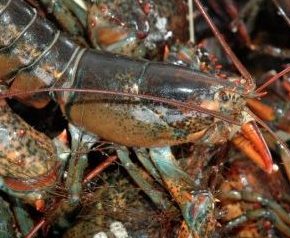
State of Maine: Lobstermen are feeling the pinch
Maine lobstermen are in a world of hurt, caught in a two-pronged assault on their livelihood. The pincer claw is the pandemic, causing their market to collapse. The crusher claw? That would be the latest lawsuit over whale rules.,, Even the elders in the fishing community are rattled. They are usually the ones who face fluctuations in the market with zen-like calm. It’s been down before, they say, and it will come back. Every year is not going to be a record-breaker. This time they’re worried. Younger fishermen who have gotten accustomed to record catches every year have taken on significant debt (bigger boats, newer trucks) and are freaking out. Jill Goldthwait >click to read< 11:09

Coronavirus: COVID-19 hits lobster industry hard
On the day when Massachusetts restaurants officially were barred from offering on-site dining for at least three weeks, boat prices for live lobster were reported to dip to as low as $3 a pound in Maine and $3.25 in Massachusetts and wholesale dealers were trying to determine their next steps. “Right now, we’re trying to figure out what we’re going to do,” said Joe Ciaramitaro, one of the owners of Capt. Joe & Sons in East Gloucester.,, “It’s tricky right now,” said Monte Rome, owner of Gloucester-based Intershell. “The restaurant business for us is obviously over for now. It’s one minute at a time, not even one day at a time.” >click to read< 05:58
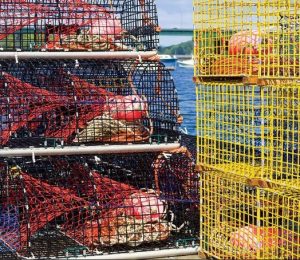
Consider the Lobster Trap. How a father-and-son manufacturing company clawed its way to the top
Riverdale Mills, a Massachusetts manufacturer that commands 85% of the U.S. market in its niche—lobster traps—has a dynamism and rich history that make it a good subject for this exercise. Riverdale Mills faces similar hurdles as corporations many times their size—tariffs, a soft market, a strong dollar, etc. (Plus, they have their own idiosyncratic hurdles, like when the lobster industry is on forced hiatus during right whale migration.),, James Knott Sr., was a polymath. His mind never rested, not even when he was fishing. A decorated Army veteran and a Harvard College grad, Knott Sr. invented several coatings while running his own manufacturing company, Coatings Engineering Corporation. Knott Sr. sold CEC in 1962, staying on as president and director. Finding himself with more free time, he took up lobster fishing in Gloucester, Massachusetts. >click to read< 07:30
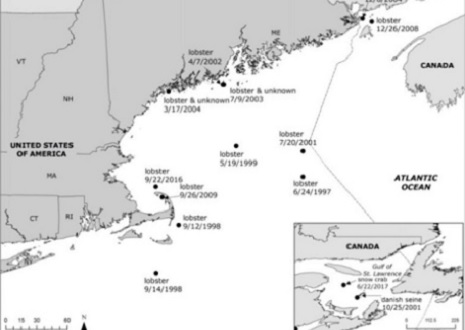
North Atlantic Right Whale: How to kill a species with Fake News, from National Geographic of all places!
“Fishing without vertical lines is what is going to save this species.“ says CT Harry of the IFAW who work hand in hand with NOAA. A ridiculous statement in view of the 18 cruise ship strikes in the Gulf of St. Lawrence (GSL) in the past few years, in all of NE over 20 years. ¼ whale per year by the lobster industry. Eighteen ship strikes in the GSL over the past 3 years averages 6 per year. These people are killing 24 whales while those people kill one. by Jim O’Connell >click to read< 13:22
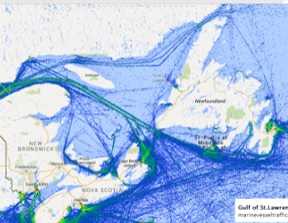 Most likely Carnival Cruise Lines is responsible for 18+ Right Whale deaths in the past 3 year, at which rate they would soon be extinct. – Human caused Right whale deaths have suddenly, in sync with a plummeting whale birthrate, put the right whale on the path to extinction. Why their birth rate, births per year, declined since a tremendous surge in 2000-2009 from 350 to 500 is unknown. In 2018 it hit bottom as no calves were born. >click to read<
Most likely Carnival Cruise Lines is responsible for 18+ Right Whale deaths in the past 3 year, at which rate they would soon be extinct. – Human caused Right whale deaths have suddenly, in sync with a plummeting whale birthrate, put the right whale on the path to extinction. Why their birth rate, births per year, declined since a tremendous surge in 2000-2009 from 350 to 500 is unknown. In 2018 it hit bottom as no calves were born. >click to read<
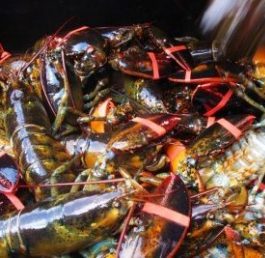
Nova Scotia: Lobster industry fears prolonged effects of coronavirus outbreak as exports halted, prices drop
A month ago, China appeared to be a land of endless opportunity for Nova Scotia’s $1-billion lobster industry, with fishers collecting record returns for their catches and exports to the Asian country growing to historic levels. Then, as travel restrictions and lockdowns in some cities were imposed in China in an effort to contain the virus, known as 2019-nCoV, lobster orders dried up almost overnight. The shore price, or price paid to lobster fishers for their catch, fell from a record high of $10.50 a pound to $8 a pound on Nova Scotia’s south shore last week, and is expected to keep falling. >click to read< 05:49
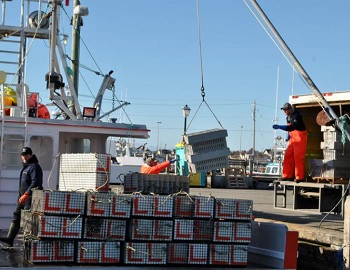
Coronavirus shuts down Chinese market for live Nova Scotia lobsters sending industry into panic mode
The sudden and unexpected temporary loss of the Chinese market for Nova Scotia live lobsters due to the coronavirus epidemic is creating a panic situation for the lobster industry.,, “Some people had inventory put away for the Chinese New Year that never got all their product over there in time,” “Everybody’s trying to push lobsters into the U.S. now so they flooded that market on Monday. To be honest we have no sales at all for our lobsters at this point,” said Cotter. >click to read< 14:42

US lobster industry hopes new deal renews trade with China
One group that is cautiously optimistic about the trade deal signed Wednesday between the U.S. and China is the lobster industry. The hope is that the deal will reopen one of the biggest markets in the world for lobsters. China is one of the biggest export destinations for lobster, which are trapped in the cold waters of the Atlantic Ocean by American and Canadian fishermen. >click to read< 06:59
Maine lobster industry will benefit from the China trade deal, Sen. Collins says – >click to read<

Lobster bait challenge winner receives $30,000 prize at Ignite Labs announcement in Yarmouth
Vince Stuart had 30,000 reasons to smile when he was announced the winner of a lobster bait challenge in Yarmouth. But he was coy when it came to one thing – actual details about his bait entry that had won the competition. For now, Stuart is keeping these details to himself and said he expects to have more to say and share about his innovation when spring rolls around. That will follow some more trials of his innovation that will take place in February during the lobster fishery off southwestern Nova Scotia. Video, >click to read< 12:43

Lobster industry split over whale protection plan called Maine’s ‘line in the sand’
Some fishermen at the South Portland meeting cheered the plan. One gave Keliher a standing ovation, saying the new proposal was much better for the lobster fleet than the task force plan rolled out in August that called for 50 percent fewer buoy lines. But fishermen in Ellsworth and Waldoboro, the site of the first two meetings this week, urged Keliher to resist federal pressure to make concessions that would hurt lobster fishermen when they pose no real threat to the whale.,, “Grow a backbone,” one lobstermen told Keliher. “Don’t give them anything now.” >click to read< 07:47
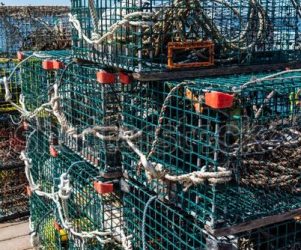
Opinion: Maine’s plan for lobster lines an improvement
A federal proposal to cut fishing lines off the Maine coast was dead in the water to lobstermen, who said it would put either their lives or ability to make a living at risk.,,, The federal proposal, released this summer, called on Maine to reduce the number of surface-to-seabed buoy lines by 50 percent in both state waters, which run out to three miles from shore, and federal waters,,, lobstermen were right to be wary of the proposal. And since industry buy-in is necessary to make any plan work, the state was right to put forward its own proposal. >click to read< 16:33

Nova Scotia premier should cancel China visits
Nova Scotia’s Opposition leader says the premier should stop visiting China – which he has done regularly throughout his mandate to promote local seafood and other industries – because of violent clashes between the state and pro-democracy protesters in Hong Kong and the continued detention of two Canadians whose freedom the federal government has been trying to secure. “He shouldn’t be visiting there, that’s for sure,” Progressive Conservative Leader Tim Houston,,, >click to read< 17:06

LePage And The Whales
Fisheries managers from the National Oceanographic and Atmospheric Administration (NOAA) are developing new rules that are likely to fall heavily on the lobster industry in New England, especially in Maine, where fishing activity is greatest.,,, Maine’s lobstermen and lobsterwomen found an ally in former Gov. Paul LePage, who recently wrote an op-ed in The Wall Street Journal decrying the proposed rules as misdirected and unnecessary. >click to read< 13:14
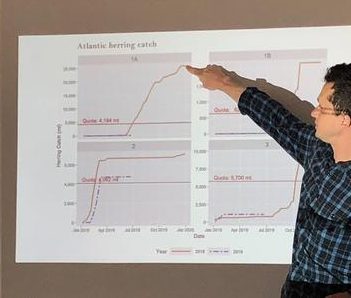
With herring shortage, lobster industry looks to other bait sources
The care and feeding of lobsters in the face of a bait crisis was the focus of a presentation at Maine Center for Coastal Fisheries ,,, With a shortage in herring, most lobstermen’s first choice to bait lobster traps, the industry is looking for solutions. “No bait is a big problem for a state that depends so much on lobster,” Stoll said. With about $60 million in ex-vessel landings value at the Stonington port in 2018, the commercial lobster industry supports thousands of local jobs, he noted. “Lobster is currently the most valuable fishery in the U.S., and 80 percent comes from Stonington.” >click to read< 10:58

Halving the number of vertical lines – Finding consensus on whale protections a tough call in Maine
Federal regulators have given Maine’s lobster industry its marching orders: Find a way to cut the number of surface-to-seabed fishing lines by 50 percent to help prevent the injury or death of even one of the endangered right whales that pass through the Gulf of Maine. The National Marine Fisheries Service is allowing each lobstering state to develop its own plan to protect the whale, whose numbers have fallen to a little more than 400 in recent years. But it will be hard to find one way to make it work in Maine, where the $485 million-a-year fishery is known for its diversity. >click to read<07:29
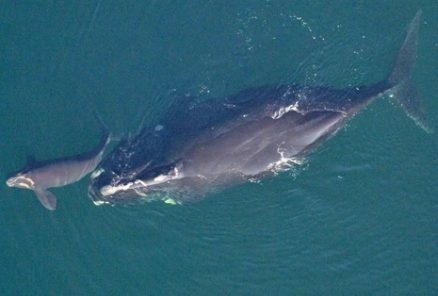
Regulators unveil new tool designed to help reduce right whale entanglements
Federal fisheries regulators demonstrated a new risk-assessment tool on Tuesday aimed at helping the survival of the North Atlantic right whale. It comes on the eve of regulatory decisions that could affect the fate of the endangered species — and the lobster industry, as well. Federal scientists said the new data model should help lobstermen and conservationists make collaborative decisions about reducing dangers that fishing gear poses for the endangered. >click to read<12:49
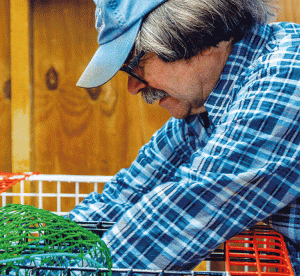
Donnie Carlson found his niche on Swan’s Island
Many people in the lobster industry see fishing as a birthright. They fish because their father fished, and maybe his father before him. Donnie Carlson started on that familiar path, but took an unexpected turn 30-plus years ago. As a boy, Carlson, a life-long resident of Swan’s Island, worked as sternman for his father during lobster and scallop season. Unlike most island boys, though, he suffered from terrible motion sickness. While he loved working outdoors, he decided early on he wouldn’t have a career on the water. >click to read<10:41
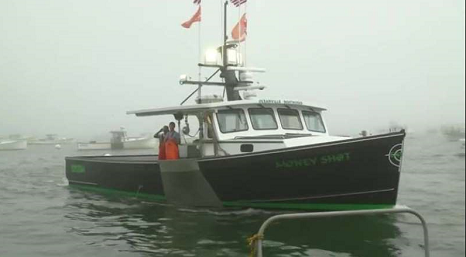
Ocean Shock: Lobster’s great migration sets up boom and bust
A lobster tattoo covers Drew Eaton’s left forearm, its pincers snapping at dock lines connecting it to the American flag on his upper arm. The tattoo is about three-quarters done, but the 27-year-old is too busy with his new boat to finish it.,,, Eaton belongs to a new generation of Maine lobstermen who are riding high, for now, on a sweet spot of climate change. Two generations ago, the entire New England coast had a thriving lobster industry. Today, lobster catches have collapsed in southern New England, and the only state with a significant harvest is north in Maine, where the seafood practically synonymous with the state has exploded. >click to read<11:54
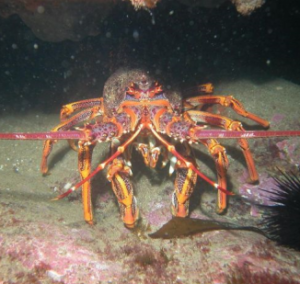
Western Australia lobster industry gets boost
The Western Australian government plans to grow the lobster industry and boost local lobster supply. In early-November, the government explained there could be a potential growth of 500 jobs and economic growth within the industry. Fisheries minister Dave Kelly said more than 95 per cent of commercially caught the region’s rock lobster is exported to China. “Little flows into our local market for the enjoyment of Western Australians and tourists.>click to read<
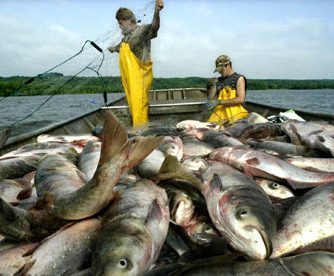
Turning an invasive problem into a bait solution
With concerns growing over a likely bait shortage in the lobster industry in Maine and Canada due to a drastic cut in the upcoming season’s herring quota, Nova Scotia resident Patrick Swim has a possible solution. Swim thinks he can solve the bait shortage by harvesting an invasive species. Silver carp is one of the four species of the invasive Asian carp (silver, bighead, grass, and black) that have placed the Great Lakes water system at risk. >click to read<19:45
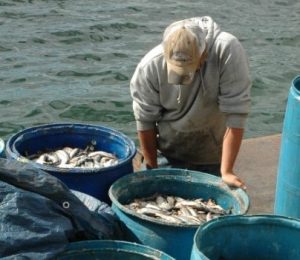
Lower herring quotas squeeze lobster trade
Last year, according to the Department of Marine Resources, lobster was Maine’s most valuable fishery with landings of 110,819,760 pounds — the sixth highest ever — worth some $450,799,283. Despite all the talk about high value species such as scallops and elvers, according to DMR herring were the state’s second most valuable commercial fishery in 2017. Herring boats like the Sunlight and the Starlight owned by the O’Hara Corp. in Rockland or the Portland-based trawler Providian landed some 66,453,073 pounds of herring worth about $17.9 million at a record price of 27 cents per pound. >click to read<10:20
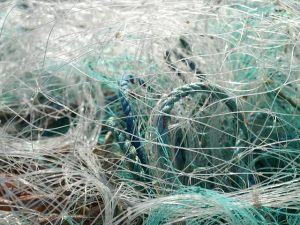
Defenders of right whales pursue limits on aquaculture and fixed gear fisheries
Right whale defenders are now taking aim at aquaculture as they try to protect the highly endangered species from deadly fishing gear entanglements. Advocates usually focus on the lobster industry,,,Right whale defenders are now taking aim at aquaculture as they try to protect the highly endangered species from deadly fishing gear entanglements. Advocates usually focus on the lobster industry,,, Researchers from Whale and Dolphin Conservation, a U.K.-based nonprofit that advocates for marine animals, want regulators to reduce surface-to-seabed lines in all Gulf of Maine fisheries, not just lobstering. They name aquaculture and gill net as rope-based fishing methods that are known to entrap, injure and kill both humpback and right whales. They say it’s not fair for regulators, who are meeting next week, to seek rope reduction from lobstermen while issuing permits for other fisheries that use similar rope. >click to read<20:40
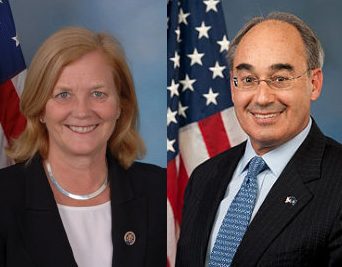
Reps. Poliquin and Pingree co-sponsor amendment to HR-200
In an effort to cut unnecessary federal fees for lobstermen, dealers and processors, Congressman Bruce Poliquin (R-2nd Dist.) and Congresswoman Chellie Pingree (D-1st Dist.) joined forces across the political aisle to amend a fisheries bill that is currently before the U.S. Senate. The bill, H.R. 200 – Strengthening Fishing Communities and Increasing Flexibility in Fisheries Management Act, passed the U.S. House 222-193 on July 11. The amendment, offered by Poliquin and co-sponsored by Pingree, directs NOAA to conduct a study of all fees imposed on all sectors of the lobster industry. >click to read<14:03
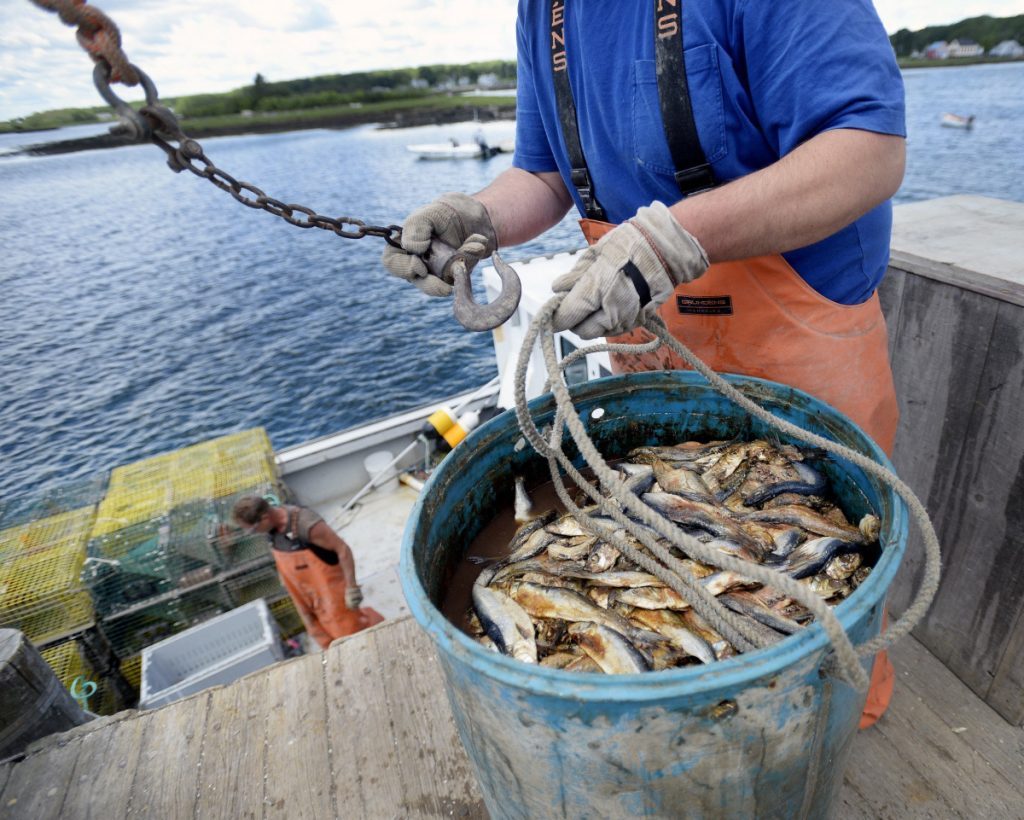
Maine: Pending bait shortage poses another threat to New England lobster industry
Regulators want to cap this year’s herring landings at last year’s levels, or 50,000 metric tons, and slash next year’s quota of the most popular lobster bait from 110,000 to 30,000 metric tons. They want to do this to offset record low numbers of newborn herring that are entering the fishery to replace those that are caught, eaten by other predators or die from natural causes. The 2019 quota could fall even lower if regulators adopt a separate proposal to leave more herring in the sea to feed the fish, birds and marine mammals that eat them, including Gulf of Maine species such as cunner, cod, seals, whales, puffins and terns. The New England Fishery Management Council could decide the issue as early as September. Eco-based Management. >click to read<10:51
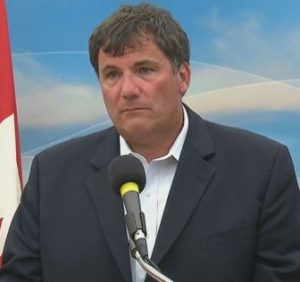
Fisheries minister meets with lobster industry today about disputed closures
Federal Fisheries and Oceans Minister Dominic LeBlanc is in Moncton on Friday to meet with the lobster industry, after new rules introduced this week to protect endangered whales left fishermen in a state of shock and frustration.,, He suggested the measures were necessary to avoid a punitive response from the U.S. and to protect the lobster industry. “Under American law, if a country does not take every reasonable and possible step to protect these highly endangered marine mammals, the American government can decide, under the Marine Mammal Protection Act of the United States, that the remedy is to close the American border to imports of fish and seafood from that country, which would have a devastating effect.”>click to read<12:10

1996: Calving of right whales faces new threats – Today: Lobstermen fear Right whale extinction threat is being overstated
The math of protecting right whales from extinction is scary stuff: The stakes are high, scientific opinion varies and some rescue plans could make it impossible for lobstermen to earn a living. Getting that math right matters when the futures of right whales and Maine’s lobster industry are so closely intertwined. Right whale numbers have dwindled to about 450 because of deadly ship strikes, fishing gear entanglements and low birth rates, while Maine’s lobster industry is the backbone of the state’s coastal economy, raking in about $434 million from landings in 2017 and generating another $1 billion for Maine in post-dock revenues. >click to read<08:56
1996: Calving of right whales faces new threats -,,, Scientists have sighted 20 calves, a record after years of falling counts. Only 320 or so of the behemoths now ply the North Atlantic.,,,at times getting hit. Other whales get entangled in fishing gear. But scientists say the roots of the problem go beyond such incidents and are increasingly a grim mystery, prompting a redoubling of protective efforts and detective work. >click to read<
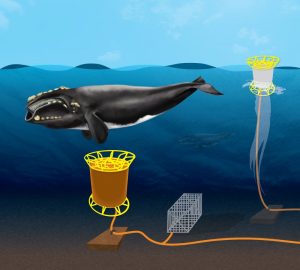
Cape Cod environmentalists plan to wreck their lobster Industry to save the whales
Scientists trying to convince New England lobstermen to invest in “ropeless fishing” to cut the risk current fishing methods pose to northern right whales, The Boston Globe reported. Scientists at the Woods Hole Oceanographic Institution say ropeless fishing will allow lobstermen to continue in their livelihood, but without long ropes running from buoys on the ocean’s surface to lobster traps on the ocean floor.,,, Scientists warn if this technology is not pursued, the only other option to save the whales is government regulation of fishing seasons and areas, which would devastate the industry much more than ropeless fishing. >click to read< 09:07



































